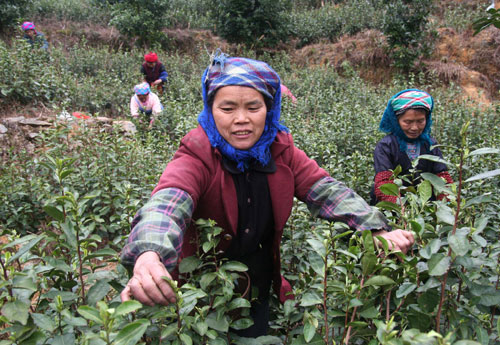Society
Narrow social life traps women in poverty
Updated: 2011-03-09 08:19
By Zhou Wenting (China Daily)
 |
|
Women pick tealeaves at the Rongshui Miao autonomous county in the Guangxi Zhuang autonomous region on Friday. [Photo/China Daily] |
BEIJING - The narrow social networks of rural women on the Chinese mainland are the main cause of their higher poverty and unemployment rates, gender studies experts said at a forum on grassroots women over the weekend.
"Although the role of women has undergone mesmerizing changes in the past decades, there are still many disadvantaged rural women locked in their in-law relations, which strongly affect their living standards," Li Xia, an anthropologist specializing in rural women and senior editor of the Commercial Press, told China Daily during the forum.
| ||||
"In rural areas, a husband's social relations determine the status and economic situation of the family, while the wife is supposed to have no social connections," Li said.
Through her study, Li found that rural women's social networks were confined within the family and inside the community. In contrast, men developed a great number of social relations outside the family.
Li said that negligence and depreciation of women's social relations has widened the gap in employment and economic status between the genders.
However, being the relatively vulnerable gender, women had inherent difficulties setting up social networks.
According to Pun Ngai, deputy director of Peking University-HK Polytechnic University Social Service Research Center, most rural women relied on family members when looking for jobs for fear of being cheated, and they seldom went out at night for fear of being bullied or teased.
"And the fact that most women return home for marriage and having children after several years' work made the situation even worse because most of their social relationships are broken," she said.
Statistics from the All-China Women's Federation showed that the income of female migrant workers was 20 percent lower than that of their male counterparts. And according to the National Bureau of Statistics, in the country's poor counties, 11 percent of women found jobs in the city, 12 percent lower than men.
"What's worse, migrant women workers from rural areas were concentrated in labor-intensive and low-intellectual industries," said Pun, who warned that if the identification system for rural women doesn't change, they will never avoid being the sacrificial lambs for "Made in China".
"We should redefine identity for rural women and encourage them to develop their social networks, which will boost their learning and employment opportunities, and eventually lift their quality of life and improve their rights," said Li Xia.
Gongyi.qq.com/jiemei.htm, a website specifically for grassroots women, was also launched on Friday in an effort to expand rural women's social networks.
The website is co-founded by Half The Sky Public Education and Tencent, one of China's major Web portals.
"We also aim to equip women laborers with knowledge so they can better protect themselves at work and in society," said Han Yanyuen, founder of Half The Sky Public Education.
Specials

NPC & CPPCC sessions
Lawmakers and political advisers gather in Beijing to discuss major issues.

Self-made aircraft
An automobile mechanic in Northeast China made a test flight of his self-made aircraft which cost about US$395.

Venetian Carnival
Masked revellers celebrate in Saint Mark's Square in Venice.



